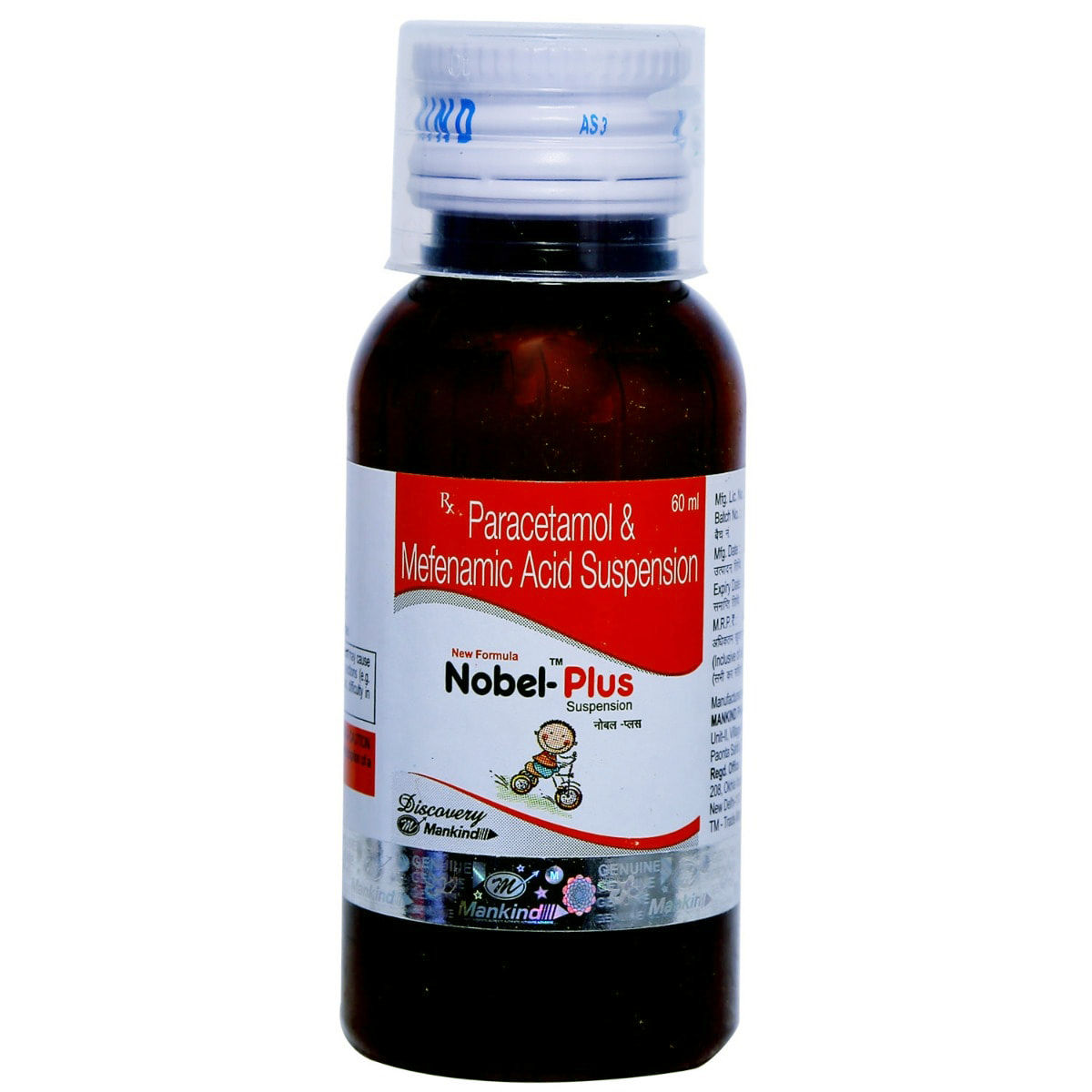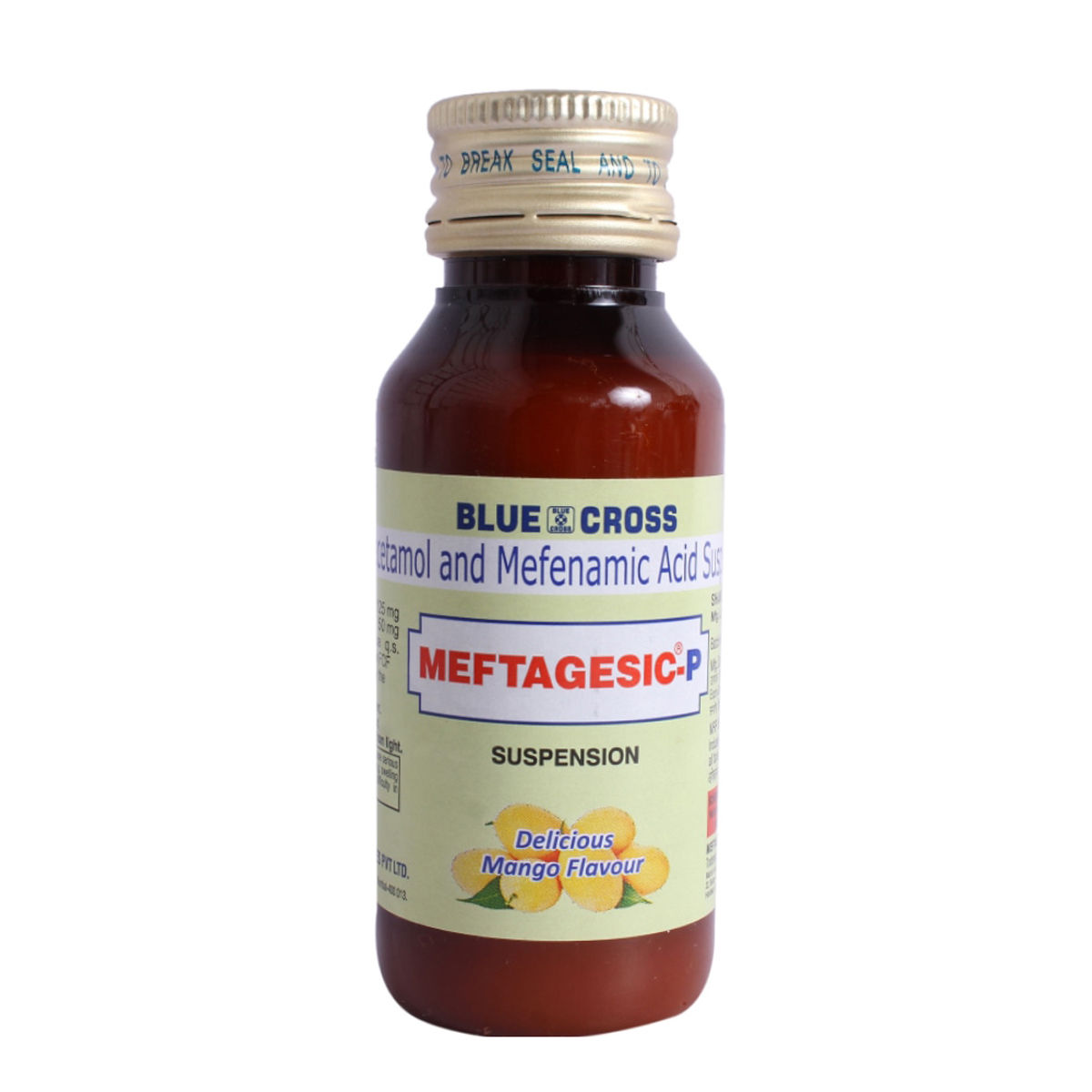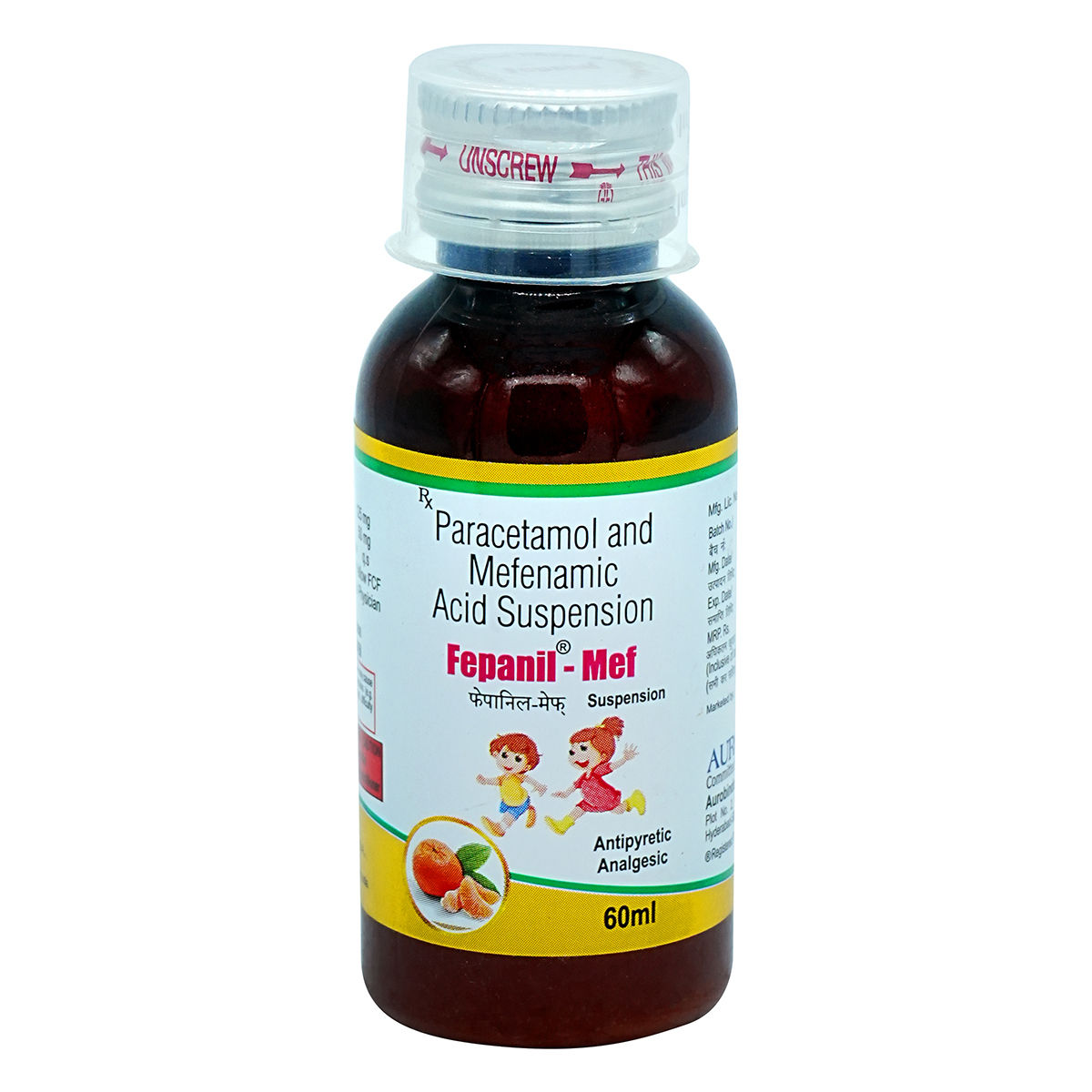Meftagesic Syrup 60 ml
Meftagesic Syrup is used to treat fever and mild to moderate pain in children. It contains Mefenamic acid and Paracetamol. It works by blocking the action of chemical messengers responsible for making the child feel the sensation of pain, swelling, and other symptoms associated with pain. It reduces a high temperature (fever) by altering the chemical messengers in an area of the brain that regulates body temperature.
₹45*
MRP ₹50
10% off
₹42.5*
MRP ₹50
15% CB
₹7.5 cashback(15%)
Free Delivery
With Circle membership
(Inclusive of all Taxes)
This offer price is valid on orders above ₹800. Apply coupon PHARMA10/PHARMA18 (excluding restricted items)
Know Your Delivery Time
Provide Delivery Location

Available Offers
 Prescription drug
Prescription drugWhats That

Secure Payment

India's Most Trusted Pharmacy

Genuine Products
Composition :
Manufacturer/Marketer :
Consume Type :
Return Policy :
Expires on or after :
About Meftagesic Syrup
Meftagesic Syrup is used to relieve pain. Pain can be acute (temporary) or chronic (long-lasting). Acute pain is short-term and caused by damage to the tissues of the muscle, bone, or other organs. Chronic pain lasts for a long duration and is caused by pathologies like nerve damage, etc. It helps provide relief from symptoms of muscle pain and dental pain in children. Meftagesic Syrup is also used to reduce fever.
Meftagesic Syrup is a combination medicine containing two drugs, namely, Mefenamic acid (NSAID) and Paracetamol (antipyretic). Mefenamic acid works by blocking the effect of a chemical known as prostaglandin, responsible for inducing pain and inflammation in our body. Paracetamol lowers the elevated body temperature and mild pain by inhibiting the synthesis of a chemical messenger (prostaglandin) and promoting heat loss (through sweating) that helps reset the hypothalamic thermostat.
Meftagesic Syrup may cause certain side effects in your child, such as abdominal pain, cold-like nose symptoms (in children), or diarrhoea (in children). These side effects do not require medical attention and gradually resolve over time. However, if the side effects persist or worsen, please consult your paediatrician. Meftagesic Syrup should be taken as advised by your doctor. Do not give more than the prescribed dose of Meftagesic Syrup to the child. Meftagesic Syrup can be given with or without food. The dose of the medicine will be decided by your paediatrician depending on the type and severity of the infection.
Meftagesic Syrup is intended for pediatric use only. Avoid giving Meftagesic Syrup to your child if she/he is allergic to antibiotics. Keep your doctor informed about your child’s health condition, including his current medications and medical history, to rule out any side effects/interactions. Before administration, inform your child’s doctor about liver and kidney disease. Meftagesic Syrup is not recommended for use in children below six months of age as its safety and efficacy are not established.
Uses of Meftagesic Syrup
Directions for Use
Medicinal Benefits
Meftagesic Syrup is a combination medicine of Mefenamic acid (an NSAID) and Paracetamol (an antipyretic). Ibuprofen works by blocking the effect of a chemical known as prostaglandin, which is responsible for inducing pain and inflammation in our body. Paracetamol lowers elevated body temperature and mild pain by inhibiting the synthesis of a chemical messenger (prostaglandin) and promoting heat loss (through sweating) that helps reset the hypothalamic thermostat.
How Meftagesic Syrup Works
Storage
Side Effects of Meftagesic Syrup
- Nausea
- Diarrhoea
- Abdominal pain
- Indigestion
What if I have taken an overdose of Meftagesic Syrup
Drug Warnings
Avoid giving Meftagesic Syrup to your child if she or he is allergic to it. Keep your pediatrician informed about your child’s health condition, including their previous medications and medical history, to rule out any side effects or interactions. Before administration, inform the pediatrician about all the OTC medicines, including other vitamin supplements, that your child is taking. It is advised not to give more than the prescribed dose of medicine. Also, inform your doctor if your child has liver or kidney-related issues before administration. Meftagesic Syrup is intended for use by children. Hence, adults, pregnant women, and breastfeeding mothers should avoid taking this medicine.
Drug-Drug Interactions
Drug-Drug Interactions
Login/Sign Up
Coadministration of Meftagesic Syrup 60 ml with Ketorolac can increase the risk or severity of gastric bleeding and ulcers.
How to manage the interaction:
Taking Meftagesic Syrup 60 ml with Ketorolac together can result in an interaction, it can be taken if your doctor has advised it. However, if you notice any unusual bleeding or bruising, other signs of bleeding, dizziness, lightheadedness, red or black tarry stools, coughing up or vomiting blood, severe headache, and weakness, you should contact a doctor immediately. Do not stop using any medications without talking to a doctor.
Co-administration of Meftagesic Syrup 60 ml with Meloxicam together can increase the risk or severity of bleeding.
How to manage the interaction:
Taking Meftagesic Syrup 60 ml with Meloxicam together is generally avoided as it can result in an interaction, it can be taken if a doctor has advised it. However, if you notice any unusual bleeding or bruising, other signs of bleeding, dizziness, lightheadedness, red or black tarry stools, coughing up or vomiting blood, severe headache, and weakness, you should contact a doctor immediately. Do not stop using any medications without talking a doctor.
Co-administration of Meftagesic Syrup 60 ml may decrease the excretion rate of Oxazepam which could result in a higher serum level.
How to manage the interaction:
Although there is a possible interaction between Oxazepam and Meftagesic Syrup 60 ml, you can take these medicines together if prescribed by a doctor. Do not stop using any medications without a doctor's advice.
Co-administration of Meftagesic Syrup 60 ml and Valdecoxib may increase the risk or severity of adverse effects.
How to manage the interaction:
Although there is a possible interaction between Meftagesic Syrup 60 ml and Valdecoxib, you can take these medicines together if prescribed by a doctor. However, if the side effects worsen, please consult a doctor.
Co-administration of Mipomersen with Meftagesic Syrup 60 ml may increase the risk or severity of liver injury.
How to manage the interaction:
There may be a possibility of interaction between Meftagesic Syrup 60 ml and Mipomersen, but it can be taken if prescribed by a doctor. Do not stop using any medications without talking to a doctor.
Co-administration of Teriflunomide with Meftagesic Syrup 60 ml may increase the risk or severity of Liver problems.
How to manage the interaction:
Taking Meftagesic Syrup 60 ml with Teriflunomide together can possibly result in an interaction, but it can be taken if a doctor has advised it. Do not discontinue any medications without consulting a doctor.
Co-administration of Lomitapide and Meftagesic Syrup 60 ml may increase the risk of severity of liver injury.
How to manage the interaction:
Although there is a possible interaction between Meftagesic Syrup 60 ml and Lomitapide, you can take these medicines together if prescribed by a doctor. Do not stop using any medications without a doctor's advice.
Co-administration of ketamine and Meftagesic Syrup 60 ml may decrease the effectiveness of Ketamine which could result in a higher blood level.
How to manage the interaction:
Although taking Ketamine and Meftagesic Syrup 60 ml together can evidently cause an interaction, it can be taken if a doctor has suggested it. If you're feeling very sleepy or having trouble breathing, it's important to contact your doctor right away. Do not stop using any medications without a doctor's advice.
Co-administration of Meftagesic Syrup 60 ml and Leflunomide may increase the risk of liver problems.
How to manage the interaction:
Although there is a possible interaction between Meftagesic Syrup 60 ml and Leflunomide, they can be taken together if prescribed by a doctor. However, if you experience fever, chills, joint pain or swelling, unusual bleeding or bruising, skin rash, itching, less desire to eat, fatigue, nausea, vomiting, abdominal pain, or yellowing of the skin or eyes, contact a doctor immediately. Do not discontinue any medications without consulting a doctor.
Co-administration of Meftagesic Syrup 60 ml and Ketoconazole may increase the risk of liver injury.
How to manage the interaction:
Although there is a possible interaction between Meftagesic Syrup 60 ml and Ketoconazole, you can take these medicines together if prescribed by a doctor. However, if you have joint pain or swelling, fever, chills, unusual bleeding or bruising, skin rash, itching, over-tiredness, nausea, vomiting, loss of appetite, stomach pain, dark-colored urine, light-colored stools, and/or yellowing of the skin or eyes, contact a doctor immediately as these may be signs and symptoms of liver damage. Do not discontinue the medication without consulting a doctor.
Drug-Food Interactions
Drug-Food Interactions
Login/Sign Up
Diet & Lifestyle Advise
- Stress affects the child’s immune system and raises the risk of illness. Hence, try progressive muscle relaxation techniques to relieve stress.
- Sleeping for 7-9 hours each night can make your child stay fit and safe.
- Make your child to drink more fluids to avoid dehydration.
Habit Forming
Therapeutic Class
Meftagesic Syrup Substitute

Nobel-Plus Suspension 60 ml
₹0.87per tabletMeftagesic-P Suspension 60 ml
by AYUR
₹0.78per tabletSumo L Plus Suspension 60 ml
by AYUR
₹1.05per tabletMefkind Forte Syrup 60 ml
₹0.91per tabletDolopar M Suspension 60 ml
₹0.85per tablet
Product Substitutes
Alcohol
Not applicable
-
Pregnancy
Not applicable
-
Breast Feeding
Not applicable
-
Driving
Not applicable
-
Liver
Caution
Please consult your doctor if your child has a liver impairment or if you have any concerns regarding this.
Kidney
Caution
Please consult your doctor if your child has a kidney impairment or if you have any concerns regarding this.
Children
Safe
Meftagesic Syrup is safe for children above 6 months of age if prescribed by the doctor. Your pediatrician will decide the dose of the medicine. Do not give your child more than the recommended dose.
FAQs
Country of origin
Manufacturer/Marketer address
Customers Also Bought
Disclaimer
Author Details
We provide you with authentic, trustworthy and relevant information























